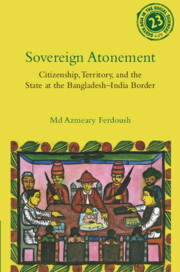Book contents
- Frontmatter
- Contents
- List of figures
- Preface
- Acknowledgments
- Introduction: Remnants, nations, and the sovereign
- 1 Sovereign atonement
- 2 From “sensitive” to “symbolic” spaces
- 3 Land and citizenship as technologies of territory
- 4 Everyday governance: Ambiguity, accountability, and abundance
- 5 Infrastructure, belonging, and the state
- 6 Refusal and tolerance
- Epilogue
- Appendix: A note on methods
- References
- Index
Preface
Published online by Cambridge University Press: 30 April 2024
- Frontmatter
- Contents
- List of figures
- Preface
- Acknowledgments
- Introduction: Remnants, nations, and the sovereign
- 1 Sovereign atonement
- 2 From “sensitive” to “symbolic” spaces
- 3 Land and citizenship as technologies of territory
- 4 Everyday governance: Ambiguity, accountability, and abundance
- 5 Infrastructure, belonging, and the state
- 6 Refusal and tolerance
- Epilogue
- Appendix: A note on methods
- References
- Index
Summary
The first time I ever heard of chhitmahals goes back to my early childhood, yet I clearly remember it. It was during one of the visits to my maternal grandparents’ house in a village in Lalmonirhat district. At one edge of the village lay Singimari River marking the international border between Bangladesh and India. Freshwater dolphins were regularly sighted in that river which, as a child, was a source of immense joy to me. Moreover, the unknown land called India on the other side of the river remained an irresistible fascination. Thus, every time my family went to my grandparents’ place, we walked along that river. During one such walk along the Bangladeshi bank of the river, where India lay across the other bank, my mother mentioned of Bangladeshi chhitmahals that were located over “there.” Although I was old enough to comprehend that countries “end” at one point and “start” from the other, I could not make sense of chhitmahals at that time. My mother explained to me that it was not just India beyond that river but also “Bangladesh was inside” India. This struck me. Although I eventually visited some of the Indian chhitmahals inside Bangladesh while growing up, nothing special about them grabbed my attention except their “weird” status as India inside Bangladesh. It was during the final year of my undergraduate studies at the University of Dhaka that I became interested again in the enclaves – this time, however, through an academic gaze. I was required to write an undergraduate thesis, ideally drawing on empirical research, as partial fulfillment of the degree. As I was in quest of a unique topic, one of my professors, Mahmuda Khatun, brought the enclaves to my attention both because she knew I came from Rangpur where all the enclaves were located and because the enclaves were in many ways “unique.” She even gave me a copy of Willem van Schendel's The Bengal Borderland which I read a number of times. I visited Dahagram–Angorpota in 2009 to conduct fieldwork for my undergraduate research monograph. This was the only Bangladeshi enclave connected to Bangladesh through a piece of land leased from India known as the Tin Bigha Corridor.
- Type
- Chapter
- Information
- Sovereign AtonementCitizenship, Territory, and the State at the Bangladesh-India Border, pp. xi - xivPublisher: Cambridge University PressPrint publication year: 2024

